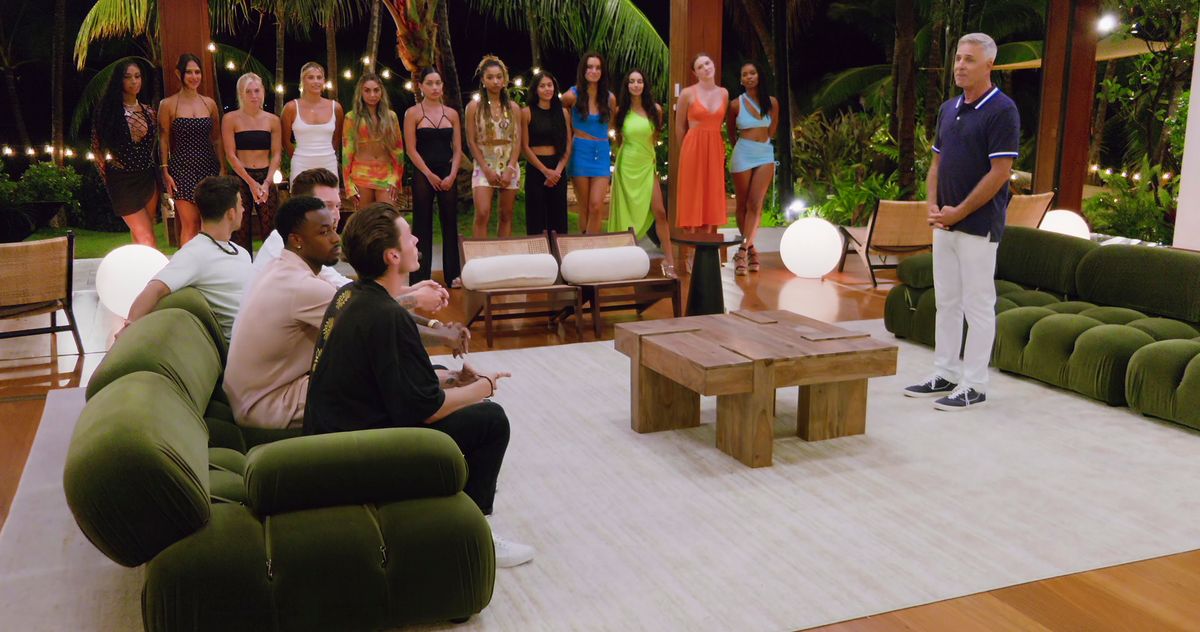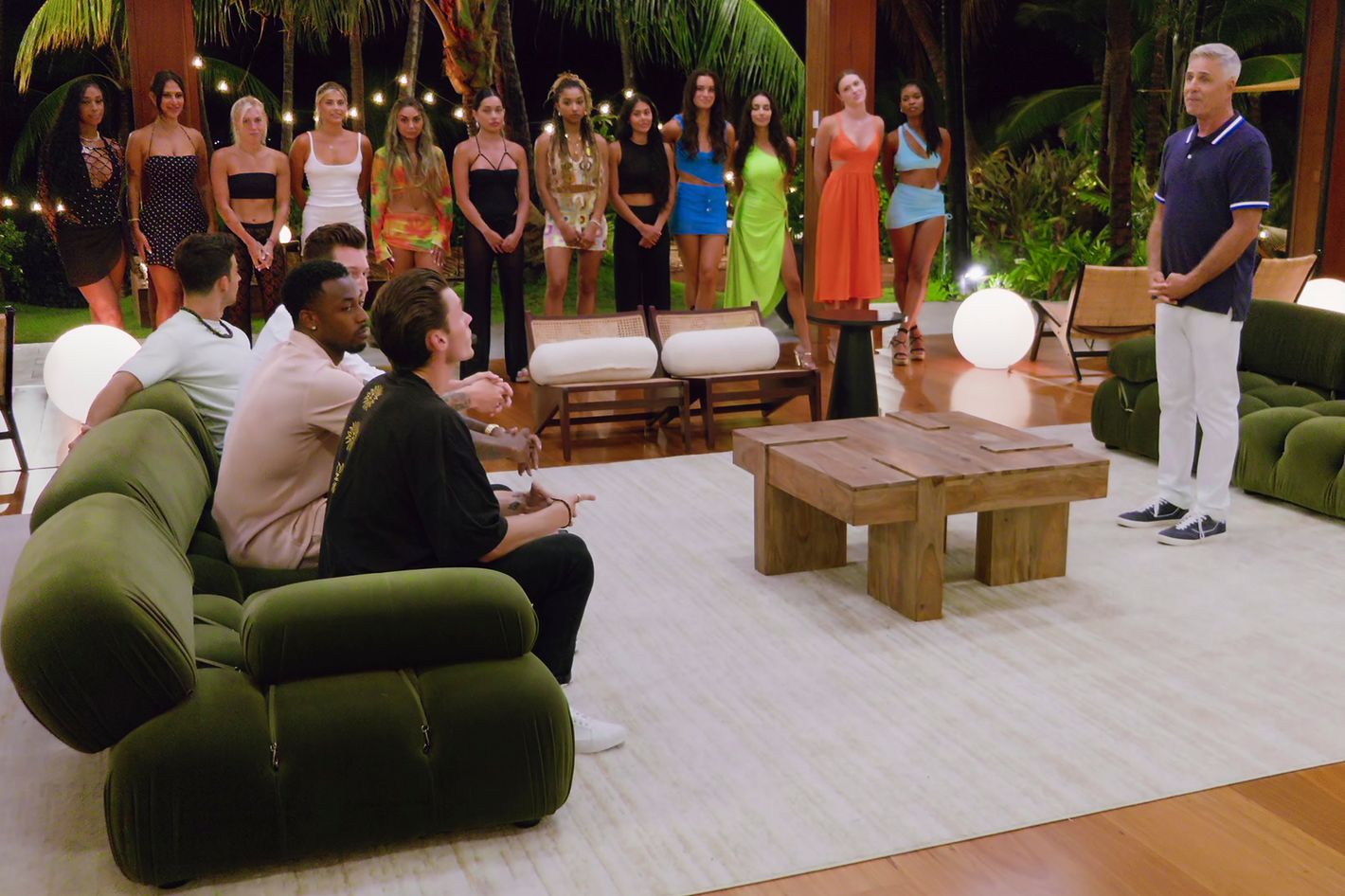Mark L. Walberg Knows He’s Too Invested in Temptation Island
“I’m hosting a show, but my goal is that you leave the island in a better place.”


You can’t have Temptation Island without Mark L. Walberg. The two are synonymous: He has hosted the series, which drops both members of a rocky relationship into separate houses chock-full of sexy singles, across two decades and three television networks. But amid a sea of somewhat removed reality hosts, Walberg is one of the few who isn’t afraid to leap into the drama — or reveal his own vulnerabilities in the process.
Every time a couple gathers at the bonfire to watch clips of what their partners get up to in the other house, Walberg steps into his role as producer-cum-therapist to steer the contestants into conversations they desperately need to have. Even if he disagrees with their actions — and many times, he does — he serves as a neutral party, digging into the reasons behind them without judgment. There’s no doubt he really cares: This season, which marks the franchise’s debut on Netflix, Walberg became particularly interested in Tayler, who opened up to him about her abandonment issues. A few days later, Walberg showed up at the house to reaffirm that she is not the product of her past experiences. Once filming wraps, he keeps up with the show’s 70-plus former contestants via Instagram.
Walberg has no formal training as a mental-health professional — he earned his high-school diploma and completed one year of college before embarking on Hollywood as an assistant at Dick Clark Productions — but he can’t imagine doing it any other way. “This shit is real for me. You may be playing the game, but I’m not, and I’m here for you afterward,” he says. “You can’t open up a can and then walk away.”
So much has changed since you first started hosting Temptation Island back in 2001. Why do you think the format still resonates with viewers?
There are certain things about relationships that don’t change: self-doubt, doubting the other person, blaming other people for things. I think what has changed is that temptation is everywhere, with Instagram and Snapchat. You can’t open your phone without somebody putting out a filtered, sexy version of themselves. But the core issues couples deal with when they’re at a crossroads, those don’t really change.
What has changed for you since that first season back in 2001? What do you know now about hosting this show that you didn’t know back then?
First of all, I was young and I didn’t have as much life experience. When we did the first season, we were inventing it on the fly. The whole point was not for me to manipulate it but to have these conversations that open the couples up. I would say over and over again, “I’m going to talk more than you need, but you’ll cut me out, and you’ll get what you need from the contestants.”
So that happened [for three seasons] and the show was whatever. Then USA picks it up 18 years later, and they hired me again, which blew my mind. At that point, reality TV was an industry and everybody knew what they were doing. They knew what to expect from their hosts — a lot of teleprompter reading, hitting these marks, and moving out of the way. But I was out of the game. I was in the invention of it, and then I was gone. So I show up to set, we go to the first bonfire, and I do my thing again, expecting them to cut me out and just get the emotion from the cast. And people are looking at me, like, What the hell is that? I’ve always approached everything the same way. I’m never a scripted guy. If you want to hire me, I just don’t know any other way to do it.
When we got to season two, during the first bonfire, I was trying to be a good boy and just hit the marks. I come off set and they go, “Something wrong at home? You’re checked out.” I said, “I’m trying to do what I thought you wanted. I’m trying to stay within the lines.” And they basically said, “Do that thing you do.” And that grew. I’m not listening to what the contestants say. I’m listening to what’s behind it. Why did they say it? It hopefully creates a relationship where they feel comfortable talking.
The empath stuff, that’s inherently me. People say it like this is some ESP-type gift — it’s just severe codependency. It’s born out of my childhood survival and fear. I listen deeper than some others do. I don’t want to get into it, because that’s for my own therapy session, but that’s something I’ve chosen to empower. And I’m uncomfortable with it, really. I just want to do the show, make the hour great, and cut me out. I don’t even want to see me.
After all these years, are you still uncomfortable seeing yourself on TV?
I don’t love it. For me to do what I’m doing, I become vulnerable. I’m making these connections and saying stuff that’s taking some chances and showing my own emotion. In reality TV, the host is not usually part of the content. So when I see that happening, my gut says, Who do you think you are? Get out of the way.
Have you ever looked back and wished you hadn’t said something at a bonfire?
When I’m doing the bonfires, I’m so in the moment that I don’t even know what I’m saying. And then when the bonfire is done, my wife is there and we do a postmortem, and then we go back to the room and she goes to bed. Then I lie there till three o’clock in the morning, going, “What the hell did I say?”
Has discussing the show with your wife affected your hosting style at all?
My wife and I got married really, really young. She is a spiritual warrior. I’m a reluctant listener, but I’m an incredible retainer. So our way of being with each other is a pretty emotionally intelligent, full-contact relationship. My kids are now adults, and we have that same relationship, too. We go there. My daughter has gone through incredible growth. My son has had some tragic shit happen and is in this process of really making that powerful. So when I go on the show, it’s husband shit. It’s dad shit.
On the show, it’s in my deal that I bring my wife. I need her as counsel, because I’ll do stuff, and people will be like, Oh my God, that was great. You’re amazing. She goes, “This was great, but where are you going here?” She’s somebody who knows me deeper. I can’t bullshit her. She’s kind of like my little private counselor. We have a crazy relationship.
After all these years, have you ever had any formal couples-therapy training?
Sometimes, there are 15 months between seasons and I’ll look at LMFT [marriage and family therapy] training. But by the time I think about acting on some sort of life coach or counseling credential, it’s time to go back to work. I just make it really clear to the contestants. I say off-camera, “Look, I’m a game-show host. I’m going to say a bunch of shit. If it fits like a good jacket, wear it. If it doesn’t, throw it away. I’m hosting a show, but my goal is that you leave the island in a better place. So use me and know that I’m more committed to your journey than is probably even healthy.”
I read that you don’t watch the clips beforehand. Why is that?
Look, I’m not going to say that I don’t get some information, but I don’t look at the clips. I really want to be able to say to them, “I don’t know what’s coming. We’ll watch it together. We’ll get through it together.” I don’t want to have to lie about that. It’s important to me to protect that as best I can.
How do you remove yourself from the larger situation of the show itself and the story line and really zero in on helping the specific person sitting in front of you?
It’s a commitment to no judgment. I really try to stay in the moment. It’s not that I’m trying to find right and wrong, but I’m trying to hear. With Grant, I said at one point, “I hear you, buddy, but there’s a gap between your actions and your words. Let’s explore that.” Sometimes, I’m still saying stuff like, “What do you think she feels?” That’s about as far as I go, but I really try to keep it separate. Whatever I’m responding to is based on what they’re saying, not what I know.
Were there any moments this season where it was hard to be neutral?
I get accused of this a lot, and I think it’s true — I’m a bit partial to the women. Being a woman is not easy. It’s really tough having to put on that armor to protect yourself. But my biggest sadness of the season is that the last bonfire is the first time we went into Brion’s past. I really wish I’d have done that earlier, because I think that’s the answer to all of it. Being able to minimize your feelings — that’s learned behavior from survival, and I have space for that. If anything, I feel like that was a failure on my part.
In particular, Tayler’s story really resonated with you this season. Why?
It’s a really common story. You see it right away when she’s watching something terrible and she’s smiling. She didn’t have to say much, but she said, “Everybody leaves me, and I would leave me too.” And it just broke my heart. I was moved. I wished I had more to say. I just did the best I could, because my heart broke for her. Nobody should have to feel that way.
When couples are watching this show, is there any skill or lesson that you’re hoping they can take away?
I don’t pretend to teach anything, but I’ll tell you something my wife, Robbi, read to me from Ram Dass, which I’ll paraphrase. In a relationship, the only thing I can do for you is work on me, and the only thing you can do for me is work on you. Then, add some patience and tolerance and forgiveness, and you got a shot.








